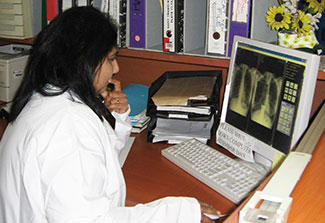Improving HIV/AIDS treatment in South Africa
July / August 2010 | Volume 9, Issue 4
Dr. Kogieleum Naidoo
Fogarty International Clinical Research Scholar
Dr. Kogieleum “Kogie” Naidoo honed her critical thinking skills during her year as a Fogarty International Clinical Research Scholar in her native South Africa. Working with mentor and Fogarty grantee Dr. Salim Abdool Karim, she contributed to a major discovery that improved outcomes for people co-infected with HIV and TB. The research team studied the optimal time to begin antiretroviral drug therapy, finding the drugs are safe and effective when given during TB treatment, contrary to widespread concerns about interactions.

Photo courtesy of Dr. Kogieleum Naidoo
Dr. Kogieleum Naidoo honed her critical thinking skills during
her year as a Fogarty International Clinical Research Scholar
in her native South Africa, contributing to a pivotal study that
led to more effective treatment of people co-infected with
HIV and TB.
“Dr. Naidoo’s research findings led to changes in the WHO and South African government’s AIDS treatment guidelines for the initiation of antiretroviral therapy in TB/HIV patients,” says Dr. Quarraisha Abdool Karim, director of a Fogarty AIDS International Training and Research Program grant.
According to Naidoo, her engagement with NIH researchers during her Scholars’ orientation in Bethesda and the mentorship onsite helped her develop the critical thinking skills that she needed to be able to participate in this level of research. Naidoo was a staff physician at the Center for the AIDS Program of Research in South Africa (CAPRISA) when she applied to the program in 2005.
Since the beginning of her medical career she has practiced in her home town of Durban - a community hit hard by the intertwined epidemics of HIV and TB. “Even as recently as five years ago, we doctors did not know what to do for co-infected people for fear of worsening one condition or the other. There was high mortality and gaps in the guidelines,” says Naidoo.
Drawn to public health research, Naidoo applied to the Scholars program to explore the possibility of becoming a researcher. Her fellowship, supported in part by the National Institute of Allergy and Infectious Diseases, did what she hoped it would, filling gaps in her undergraduate studies and deepening her understanding of epidemiology, biostatistics and health economics. There were practical components, too, such as learning how to estimate project costs.
“Working with my mentors, Dr. Salim Abdool Karim and Dr. Quarraisha Abdool Karim, and experiencing firsthand their dedication, visionary thinking, and logical and rational approach to public health research was by far the most important aspect of my experience,” says Naidoo.
One year after her fellowship, Naidoo became director of the Durban and Vulindlela CAPRISA AIDS treatment programs, which are supported by the U.S. President's Emergency Plan for AIDS Relief - known as PEPFAR - and other organizations. She helped establish additional centers, including the only rural source of antiretroviral therapy. She manages a staff of 100 that treats thousands. Under her leadership, nurses, pharmacists’ assistants and lay counselors received additional training and responsibility. She says these practical changes were influenced by her Fogarty experience.
Naidoo is the lead scientist on many projects researching treatment for co-infected patients. She also teaches: a course in infectious diseases to undergraduates, TB/HIV management to post-grads and research methods to physicians.
Naidoo says she has always been driven to work toward a solution to the overwhelming burden of AIDS and TB in her country. “In addition to reducing suffering from the disease itself, I wanted to do something to alleviate the helplessness and frustration that pervades medical services in South Africa.”
More Information
To view Adobe PDF files,
download current, free accessible plug-ins from Adobe's website.
Related Fogarty Programs
Related World Regions / Countries